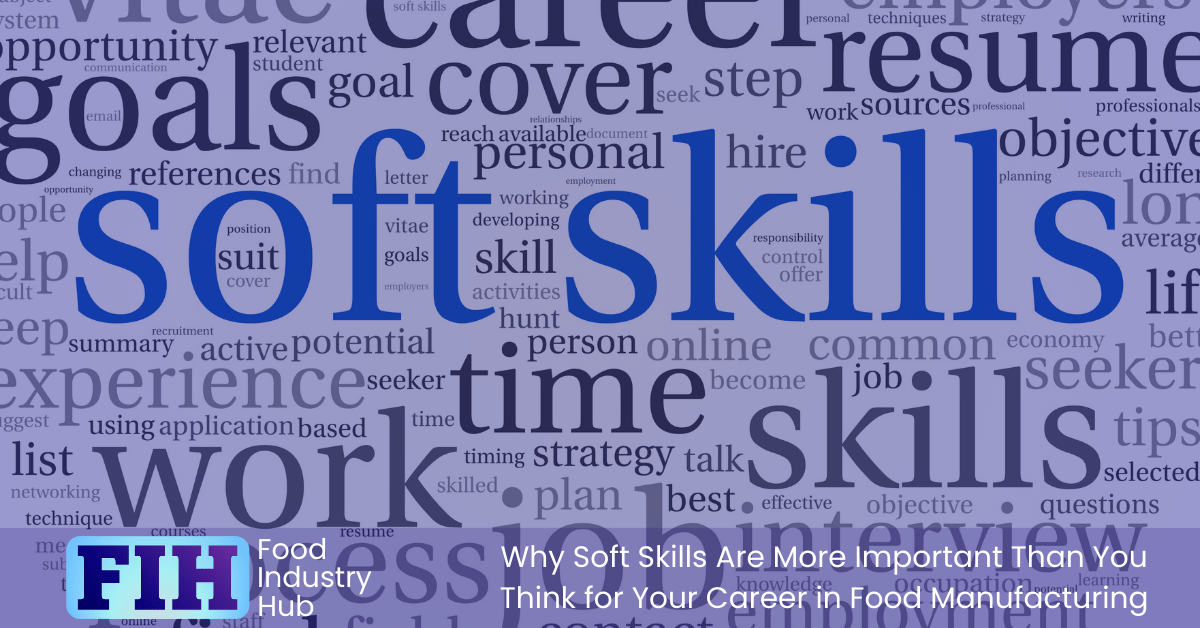Introduction
In the demanding world of food manufacturing, technical skills can only take you so far. Take, for instance, a skilled food scientist who struggles to communicate effectively with their team. While technical competency may secure you a job, it’s the soft skills that pave the way for career advancement.
How you navigate challenges, collaborate with others, and lead with empathy can make all the difference in your trajectory within the industry. But why exactly are these interpersonal skills so crucial?
This post is part of a collection we’ve put together to explore the topic of professional success, and you can explore the topic in more detail by browsing the related content.
Table of Contents
Key Takeaways
- Effective communication and teamwork are essential for success in food manufacturing careers.
- Adaptability and problem-solving skills are crucial in overcoming challenges.
- Building strong relationships and social capital enhances productivity and innovation.
- Demonstrating integrity and reliability contributes to personal reputation and career success.

The Importance of Soft Skills
Developing strong communication and teamwork skills is essential for success in food manufacturing. In this industry, effective communication ensures that processes run smoothly and that products meet quality standards. When working in a team, being able to clearly convey ideas and collaborate with others is crucial for achieving common goals. By honing your soft skills, you can enhance productivity and efficiency in a fast-paced manufacturing environment.
The ability to adapt to different situations and work well with diverse teams is highly valued in all professional settings. Strong interpersonal skills allow you to build rapport with colleagues, supervisors, and clients, fostering positive relationships that contribute to a harmonious work environment. Active listening skills play a vital role in understanding instructions, feedback, and concerns, leading to improved performance and job satisfaction.
Possessing strong problem-solving and critical thinking skills can help you navigate challenges that may arise during the production process. By thinking creatively and analysing situations from different perspectives, you can contribute innovative solutions that benefit both the company and its customers. Without question, mastering soft skills is key to excelling in food manufacturing careers.

Sign-up for the Food Industry Hub Mail Service
We regularly produce new content for food industry professionals, and the Food Industry Hub Mail Service is the best way to stay up to date with the latest additions.
Signup today to be added to the Food Industry Hub mailing list.
Technical Competency Gets You Hired, Soft Skills Get You Promoted
To secure a position in food manufacturing, technical competency may be the initial requirement, but it’s your soft skills that will pave the way for career advancement and promotions. While technical skills and knowledge are crucial for landing a job in the industry, it’s your ability to communicate effectively, collaborate with team members, lead projects, and adapt to various situations that will set you apart for promotions.
Employers value employees who not only excel in their technical roles but also demonstrate strong interpersonal skills. As you progress in your career, the importance of soft skills becomes more evident. Your ability to lead a team, resolve conflicts, and communicate with clarity can determine your suitability for higher positions within the company.
Moreover, soft skills like emotional intelligence, problem-solving, and adaptability are essential for navigating the dynamic and fast-paced environment of food manufacturing. By continuously honing your soft skills alongside your technical competencies, you position yourself for long-term success and advancement in the industry.

Communication: A Vital Skill
Effective communication is essential for successful collaboration and productivity. Clear and concise communication ensures that everyone in the team understands their roles and responsibilities, leading to smoother operations and efficient problem-solving. When you communicate effectively with your colleagues, you foster a positive work environment where ideas can flow freely, and feedback is valued.
In food manufacturing, being able to convey information accurately is crucial to prevent errors that could compromise product quality and safety. Whether you’re discussing production schedules, ingredient specifications, or quality control measures, being able to articulate your thoughts clearly can prevent misunderstandings and costly mistakes.
Strong communication skills are vital during team meetings, where you need to express your ideas, listen actively to others, and work towards consensus. By being a proficient communicator, you can build strong relationships with your coworkers, enhance teamwork, and ultimately contribute to the overall success of the food manufacturing process.
Investing time and effort into improving your communication skills is essential for anyone looking to succeed in the food industry. Whether you’re just starting out or looking for ways to take your career to the next level, honing this important soft skill will pay off both professionally and personally over time.

Overcoming Challenges and Conflict
Navigating challenges and conflict in food manufacturing requires adaptability and effective problem-solving skills to maintain productivity and teamwork. In this fast-paced industry, unexpected issues can arise, such as supply chain disruptions, equipment failures, or disagreements among team members. When faced with these challenges, it’s essential to approach them with a positive mindset and a focus on finding solutions.
Conflict resolution is a key skill in overcoming challenges – whether it’s a difference in opinions on production processes or conflicting priorities within a team, addressing conflicts promptly and constructively is crucial. Active listening and open communication play a vital role in resolving conflicts and preventing them from escalating.
Being proactive in identifying potential challenges before they become major issues can help streamline operations and prevent disruptions. By staying vigilant and addressing problems early on, you can maintain a harmonious work environment and ensure that the production process runs smoothly. Remember, tackling challenges head-on with a solutions-oriented approach is key to success and will propel your career forward.
Developing strong soft skills is essential for anyone looking to succeed in the food industry. By cultivating effective communication, empathy, and adaptability, you’ll be better equipped to handle whatever comes your way – whether it’s a challenging audit or an unexpected obstacle in your career path.

Empathy in the Workplace
In the workplace, fostering empathy towards your colleagues can enhance teamwork and collaboration, leading to a more positive and supportive environment. Empathy involves understanding and sharing the feelings of others, which can be incredibly beneficial in a food manufacturing setting. By empathising with your coworkers, you can build stronger relationships, improve communication, and create a more harmonious work environment.
When you practice empathy at work, you show your colleagues that you value their perspectives and emotions. This can lead to increased trust and cooperation among team members. For example, when a coworker is facing a challenging situation, taking the time to listen and offer support can make a significant difference in their morale and productivity.
Empathy can help to prevent conflicts and misunderstandings. By putting yourself in someone else’s shoes, you can better appreciate their point of view and approach disagreements with a more open mind. This can lead to more effective problem-solving and decision-making processes within your team.

Building Positive Relationships
Fostering strong connections with your colleagues is essential for a thriving work environment. Building positive relationships not only enhances teamwork but also creates a supportive atmosphere where ideas can flourish. By actively listening to your coworkers and showing genuine interest in their perspectives, you can cultivate trust and respect within the team.
Open communication is key to establishing positive relationships. Be approachable and willing to engage in constructive conversations. By sharing insights and information transparently, you contribute to a culture of collaboration and mutual understanding. Offering help and support when needed demonstrates your commitment to the team’s success.
Taking the time to celebrate achievements and milestones together can strengthen the bond among team members. Recognising each other’s efforts and contributions fosters a sense of camaraderie and motivates everyone to strive for excellence. Remember, in the fast-paced environment of food manufacturing, having a network of positive relationships can make a significant difference in your overall job satisfaction and success.

Qualities of a Good Leader
To excel as a leader in food manufacturing, possessing qualities such as clear communication, decisiveness, and adaptability is crucial. Clear communication is essential for ensuring that tasks are understood and executed properly within a team. As a leader, being able to convey expectations, provide feedback, and address concerns effectively is key to maintaining a productive work environment.
Decisiveness is another vital trait in leadership roles. Making timely decisions, even in the face of uncertainty, helps in moving projects forward and instils confidence in your team.
Additionally, adaptability is a valuable quality for leaders in the ever-evolving food manufacturing industry. Being able to adjust to changes, whether it’s new technologies, regulations, or market trends, is essential for staying competitive and driving innovation within your team.

Building Social Capital and Goodwill
Building social capital and goodwill involves establishing and nurturing strong relationships with colleagues, clients, and industry partners. By fostering meaningful connections, you can create a supportive network that can be beneficial for your career growth and success.
Collaborating effectively with colleagues within your organisation can lead to increased productivity, innovative solutions, and a positive work environment. Building trust and rapport with your team members can enhance communication, teamwork, and overall job satisfaction.
When it comes to clients, maintaining good relationships is crucial for customer satisfaction, repeat business, and positive referrals. Listening to their needs, providing excellent service, and addressing any concerns promptly can help solidify your reputation and credibility in the industry.
Furthermore, establishing strong ties with industry partners can open up opportunities for collaborations, knowledge sharing, and professional development. By actively participating in industry events, conferences, and networking activities, you can expand your connections and stay updated on the latest trends and best practices. Investing in building social capital and goodwill can significantly impact your career advancement in the food manufacturing sector.

Personal Reputation
Establishing a strong personal reputation in the food manufacturing industry is essential for gaining trust and credibility among peers and stakeholders. Your reputation is built on how you conduct yourself, deliver on promises, and interact with others. Consistently demonstrating honesty, reliability, and expertise will help you earn the respect of your colleagues and superiors.
In food manufacturing, where safety and quality are paramount, your reputation can directly impact the success of the products you work on. Stakeholders such as customers, suppliers, and regulatory bodies are more likely to trust and support individuals with a positive reputation for integrity and professionalism.
Building a strong personal reputation takes time and effort but can open doors to new opportunities and career growth. By consistently delivering high-quality work, fostering positive relationships, and acting ethically, you can enhance your reputation and differentiate yourself in a competitive industry. Remember, your reputation precedes you, so make sure it reflects your values and capabilities accurately.

Unlocking Career Success
To unlock career success in the food manufacturing industry, it’s crucial to continually hone and showcase your soft skills alongside technical expertise. Soft skills like effective communication, teamwork, problem-solving, and adaptability are highly valued by employers in this fast-paced and collaborative environment. By actively developing these skills, you can set yourself apart and position yourself for advancement opportunities within the industry.
One key aspect of unlocking career success is building strong relationships with colleagues, supervisors, and clients. Cultivating a reputation as a reliable and cooperative team member can lead to increased responsibilities and recognition for your contributions. Additionally, seeking out mentorship opportunities and being open to feedback can help you continuously improve and grow in your role.
Staying informed about industry trends and technological advancements can demonstrate your commitment to professional development and innovation. By staying proactive and adaptable in your approach, you can navigate challenges and seize opportunities for career advancement in the dynamic field of food manufacturing.
In Summary
Unlocking your potential in the food industry journey requires a combination of technical and soft skills. While technical skills are essential for performing specific tasks, soft skills are equally important in building relationships with customers, colleagues and stakeholders. Developing strong soft skills such as communication, empathy, teamwork, leadership and problem-solving can help you navigate the complexities of the food industry successfully.
Soft skills play a crucial role in advancing your career in food manufacturing. While technical competency may get you hired, it’s your soft skills that will ultimately set you apart and help you climb the ladder.
From communication and empathy to leadership and building social capital, these qualities are what’ll propel you towards long-term success in the industry.
So, don’t underestimate the power of your soft skills in shaping your career trajectory.
Further Resources
Food Industry Hub serves the food industry with a range of digital resources for the benefit of both commercial food manufacturers and food industry professionals.
For food manufacturers, we offer integrated management systems that give every user a direct interface with your QMS.
For food industry professionals, we provide an extensive signposting service in addition to informational content we hope you’ll find useful as you face new professional challenges. We have very ambitious plans to expand the range of services offered, and currently present informational content on management, safety and quality, food safety and quality culture, and professional success.















